On April 11, 2020, exactly one month after the World Health Organisation (WHO) declared COVID-19 a pandemic, Kano State confirmed its first positive COVID-19 case. In the same month, the state witnessed what was described as “mysterious” deaths, claiming hundreds of lives including the Emir of Rano and seven professors from Bayero University Kano (BUK).
Hajara Ibrahim alias Umma, 47, is a mourning mother of five who lost her husband amidst the mysterious deaths, in Hotoro, Nassarawa local government of Kano State. Initially, Umma didn’t believe that COVID-19 was real. “Haven’t you heard what the scholars said?” asked Umma, in a regretful tone, as she referred to a video she watched on her son Abdul’s smartphone. In the video, a bearded man was saying, “COVID-19 is a scam and a grand plot against Muslims”. Abdul said he got the video from a WhatsApp group to which he belonged.
In a state like Kano, which was once the epicentre of the disease in Northern Nigeria, the risks of fake news and misinformation cannot be overemphasised. Misinformation spreads widely on social media and majority of the victims are local community people like Umma, who usually do not even have direct access to this misinformation. Yet, it has shaped their thoughts to develop beliefs like “COVID-19 is a scam”, “It will not survive Kano’s hot temperature”, “It affects and kills only the old”, which made them rebuff the NCDC guidelines.
Strategic messaging through relevant platforms
Freedom Radio (the first indigenous private radio station in northern Nigeria) and Arewa Radio are two of the most influential radio stations in Kano. According to GeoPoll Radio Ratings, both stations compete with BBC Hausa, with each attracting 623,000 unique listeners and 64% reach in rural Kano in 2018. In urban Kano, Freedom Radio ranked first with 2.5 million unique listeners while Arewa Radio had 2.4 million unique listeners.
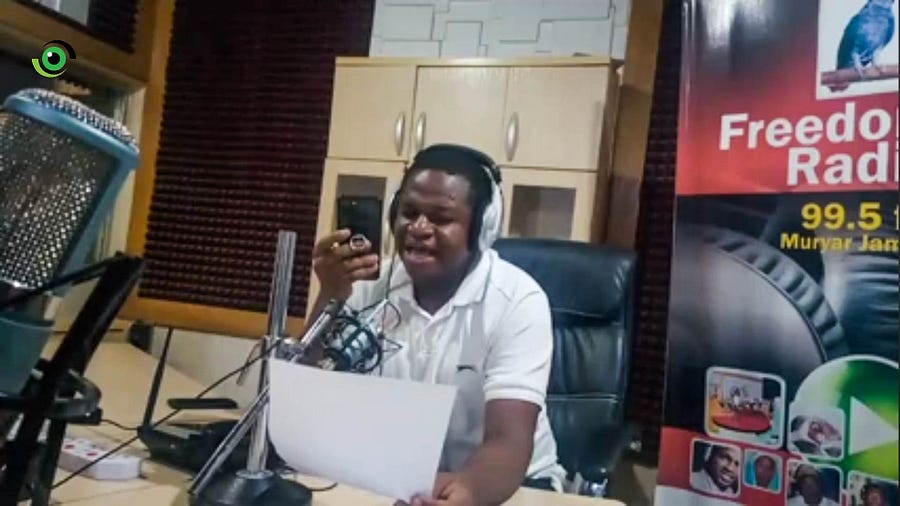
In February 2020, Arewa Radio 93.1FM and Freedom Radio 99.5FM begun broadcasting public awareness messaging on COVID-19, even before the index case in the country. “We understood that from the nature of the spread in other countries, it was only a matter of time before it struck us here in Nigeria. Having one of the highest populations in the country, we did not want to take chances,” Ado Sa’idu Warawa, Station Manager at Freedom Radio Kano, said.
Between February and April, when Lagos and Kano states recorded their first cases, there was a lot fake news that led to panic, mistrust and misinformed decisions. Therefore, according to Bashir Sarki, a radio presenter at Arewa Radio, they saw the need to do more than just reading figures on how far the virus had spread. They developed new strategies to demystify the virus, debunk false information and build trust and confidence between public health officials and the community.
Warawa noted that the influence of religious and traditional leaders in Kano is huge. “The first thing we did was to engage clerics of both faiths, traditional leaders and other stakeholders. We dedicated ‘Duniyarmu A Yau’ (Our World of Today), our 2-hour flagship program, to host these stakeholders where they dispel rumours, advise people to only listen to experts and take measures to prevent the disease,” he said. The station also dedicated more time to air jingles informing listeners on safety guidelines set by the Nigeria Centre for Disease Control (NCDC) and the World Health Organisation (WHO).
On the day Kano confirmed its first case, April 11, 2020, the Open Society Initiative for West Africa (OSIWA), an organisation promoting democratic values, in partnership with Freedom Radio began broadcasting a one-hour program daily (except on Thursdays) titled, “Fadakarwa kan Cutar Korona”(Demystifying COVID-19). “We have hosted the state and presidential taskforces, and lawyers on the program to enlighten the masses on their rights during lockdown. The guests also address rumours and misinformation on COVID-19. The program has attracted more followership on the station’s Facebook page where it is also aired live, Warawa added.
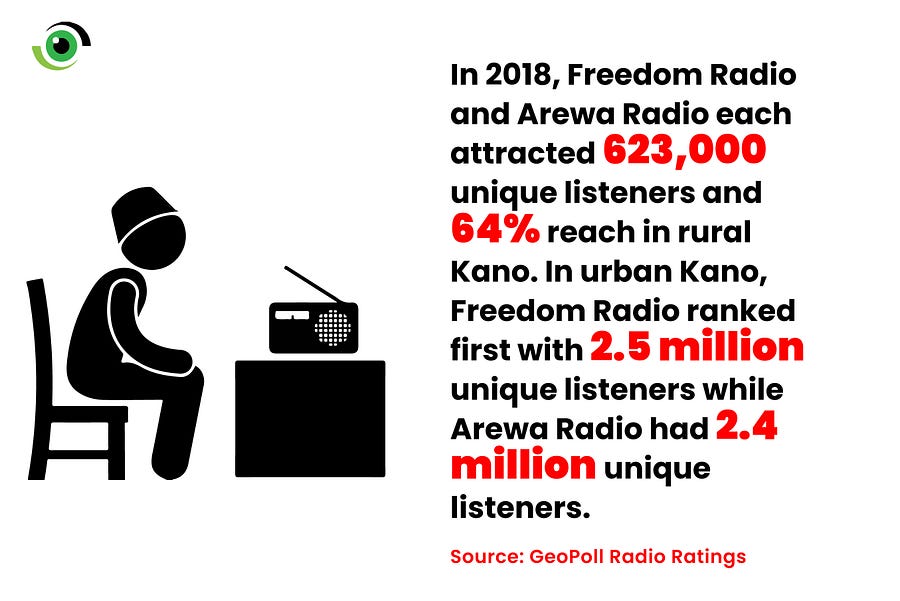
Leveraging partnerships for expert content
Organisations such as UNICEF, McArthur Foundation, and Kano Concern Citizens Initiative (KCCI) have also sponsored jingles and programs on COVID-19 in Kano. One program sponsored by the Center for Research and Democratic Studies, BUK in partnership with McArthur Foundation had sociologists and psychologists discuss mental health where they took people through coping mechanisms during the lockdown to avoid depression. The 30-minute programme also had dieticians guide people especially pregnant women and nursing mothers on nutritious food they need due to markets being closed. As part of Freedom Radio’s corporate social responsibility, Warawa said they issued a 50% discount to partners for COVID-19 programs.
Arewa Radio which broadcasts only in Hausa introduced a one-hour program, “Mu Kawar da Korona” (Eradicating COVID-19). It focuses on ways in which everyone can be part of the response against the disease. “Mu Kawar da Korona” is aired twice a day, once in the morning at 8a.m. and once in the evening at 4 p.m. The choice of time was purposeful, “Most northerners listen to the radio in these times, a habit they developed for decades from listening to BBC Hausa”, Sarki said.
Muhammad Bashir Ishaq, a resident in Nassarawa local government and a journalist, is an avid listener of Freedom Radio’s “Rayuwa da Korona” (Living with COVID-19) program. He says he enjoys the program but wished it was accessible online. “I just wish Freedom Radio also present the program live on Facebook so that I don’t have to carry my Kachibo radio set along, since many of us now use the social media during the lockdown,” he said.
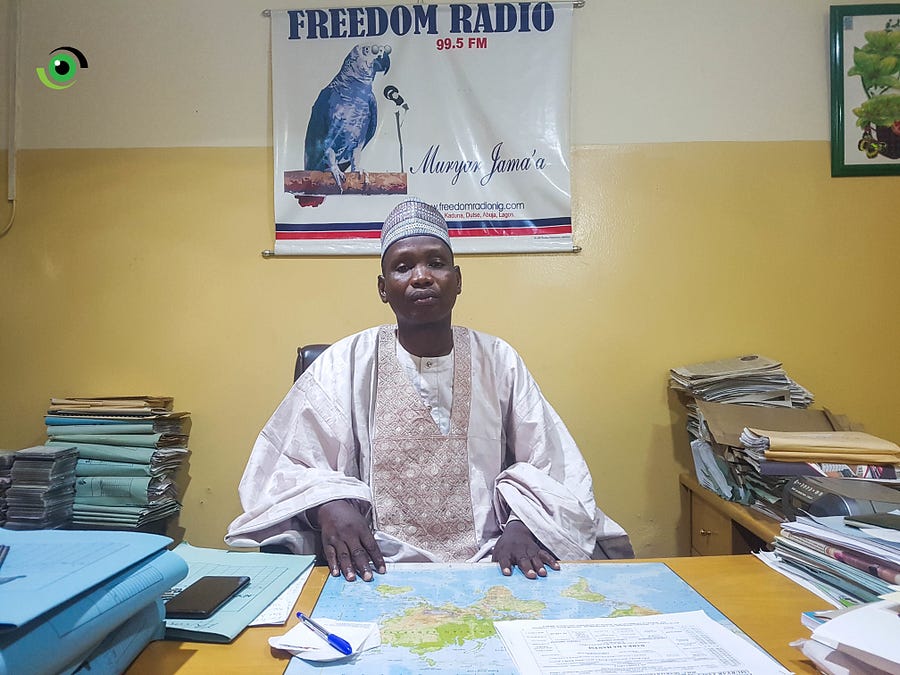
Unlike other COVID-19 programs, “Rayuwa da Korona” on Freedom Radio has an international dimension. “We understand that this virus isn’t restricted to Nigeria alone. It will be beneficial to our listeners, including the authorities and health officials to know how people are responding and living with the pandemic in other countries,” Warawa said. They reach out to and collate reports from countries like Cameroon, Ghana, Niger and Benin Republic and neighboring states in Nigeria like Katsina, Kaduna, Jigawa and Plateau State.
Feedback mechanisms to dispel misinformation
During the programme, listeners are able to ask questions which are answered by Dr. Ibrahim Musa, an Epidemiologist and a Consultant at Aminu Kano Teaching Hospital (AKTH). The programme also includes a segment where Freedom Radio’s Digital Media Coordinator, Bashir Sharfadi, counters trending fake news on COVID-19. The segment, “labaran kanzon kurege” (fake stories) is then exported for dissemination to engage audiences on WhatsApp and other social media platforms.
Misinformation also poses a challenge to media houses as they may receive news stories from fake sources. For accuracy, radio stations rely on the NCDC and Federal Ministry of Health as their sources of COVID-19 related information. Freedom Radio also partners with Africa Check, an independent non-profit fact-checking organisation, for verification of information.
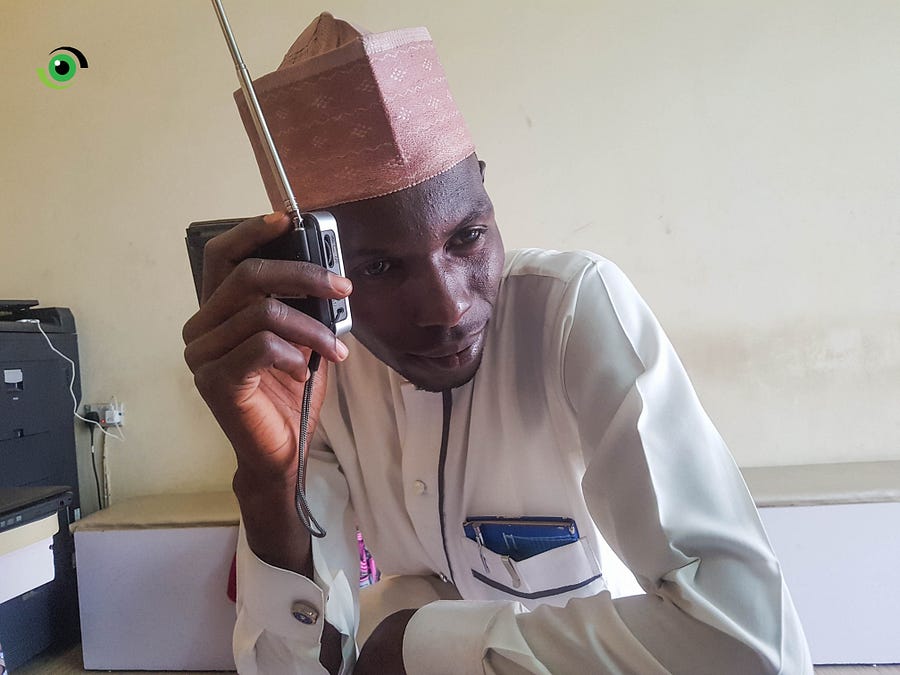
Speaking about the impact of these programs, Warawa said, “The most important thing is that people are listening to us. We know this from the feedback and questions we receive from different parts of the world. The aim of a successful communication is to have a change of behavior. And people are changing”.
Radio stations in Kano served the purpose of door-to-door awareness especially when strict physical distancing measures were put in place. Local programmes such as Rayuwa da Korona have played a huge role in dispelling rumours and creating awareness about COVID-19.
Radio stations should consider the use of infographics in local languages on their social media pages. International non-governmental organisations in partnership with local civil society organisations and state governments are playing an important role in the response to the pandemic. Governments at both federal and state levels must encourage and support local private radio stations such as Arewa and Freedom radio stations to do more by sharing accurate information to prevent the spread of the disease.
How are local radio and television stations in your area preventing the spread of the disease? Do you know any radio or TV station that produces COVID-19 related programmes in local languages? Please share with us below or on social media, @nighealthwatch on Twitter and @nigeriahealthwatch on Facebook and Instagram.


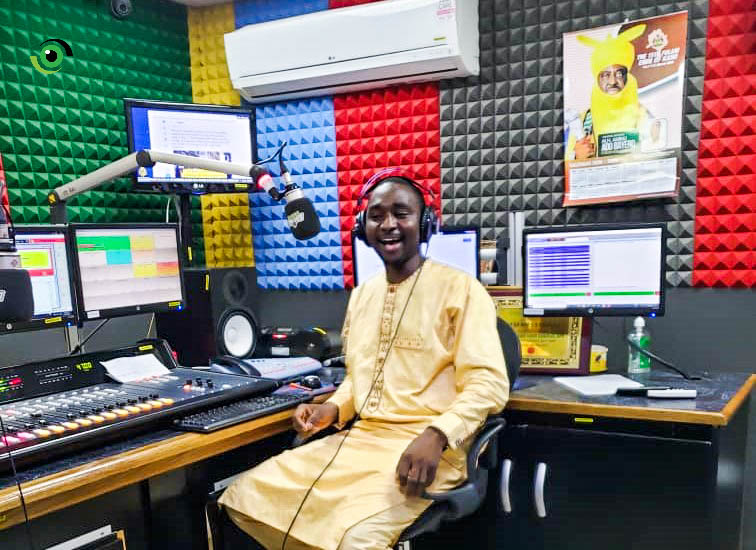
A nice and wonderful work done. More ink to your pen @ El-Hamza, Allah ya daga daraja, Amiin.
MB Ishaq